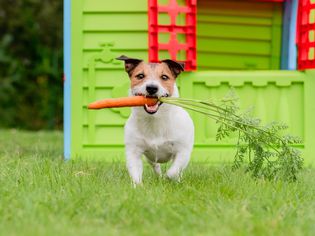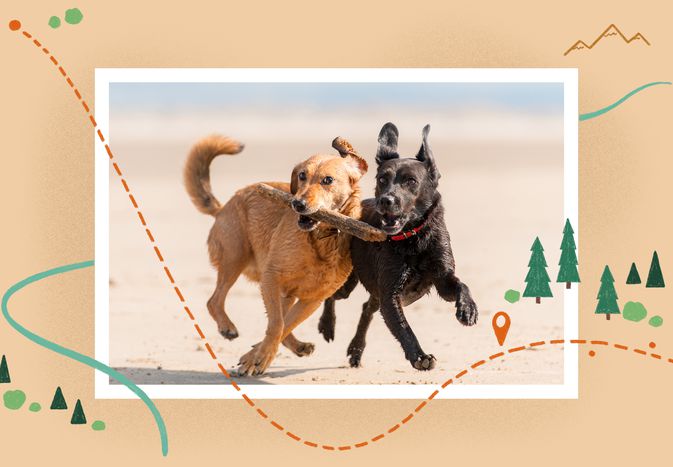It may be hard to get your kids to eat their veggies, but your four-legged family member would likely have no issues gobbling down a plateful of greens. Fortunately, many vegetables are not only safe for dogs, but actually beneficial to their health—just like they are for humans.
Are Vegetables Safe for Dogs?
The short answer is, yes, most vegetables are safe for dogs. However, pet owners should always keep portion sizes controlled, and avoid preparing vegetables in garlic or butter. While most dogs obtain all the nutrients they need from their diets, incorporating certain vegetables can provide them with important health benefits. Better yet, since veggies are low-fat and low-calorie, they can make a great dog treat alternative because they won't put Rover at risk for obesity or other weight-related health issues.
However, there are some exceptions to the rule, as certain vegetables should not be offered to your four-legged friend. One example is asparagus, as even though it isn't technically toxic to dogs, it's too tough for them to consume raw—and when it's cooked to the appropriate level of softness, it has lost the nutrients that would benefit your pup in the first place.
Can Eating Vegetables Benefit Dogs?
Vegetables are bursting with vitamins and minerals, and they're also packed with protein, fiber, and other nutrients that can help improve everything from your dog’s vision to their bone density. Consuming vegetables like broccoli, green beans, or carrots has been known to provide our pets with health benefits ranging from better healing from wounds, healthier hearts, and even the ability to ward off certain illnesses, including cancer. Veggies like celery or carrots aren't only fun for dogs to munch on, but they can also be beneficial for your dog's teeth and breath.
Vegetables like carrots, peas, or green beans can be offered to your dog either raw or cooked, but since their digestive systems aren't quite as efficient at extracting nutrients from densely fibrous vegetables, they'll be easier to digest (and less likely to cause stomach upset) if they're cooked. The most important thing to keep in mind when preparing veggies for your pup is that they should not be cooked in any spices, oils, or other seasonings or additives, like butter, as they can be harmful to your dog and potentially lead to weight gain and other health issues. Garlic is a particularly hazardous vegetable seasoning, as it has proven to be toxic to dogs.
The Dangers of Vegetables for Dogs
Like all “people” food, vegetables should only be offered in moderation (and with the OK from your pet's veterinarian). Some types of vegetables come with their own unique dangers; for example, there is a danger associated with broccoli because the florets contain isothiocyanates, which can cause mild to severe gastric irritation in some dogs. Isothiocyanates are a naturally-occurring sulfur-based plant compound that can be found in several other dark green vegetable varieties, including broccoli, kale, and cabbage. So for dogs, eating too much broccoli, kale, or cabbage could actually prove fatal.
Another example is spinach, which is high in oxalic acid and can block your dog's ability to absorb calcium and even lead to kidney damage. Your dog would have to consume a very large amount of spinach to be at risk, but nevertheless, veterinarians warn about offering this particular leafy vegetable.
More importantly, there are some vegetables that are considered highly toxic to our pets and should never be offered, such as mushrooms. Wild mushrooms can be particularly toxic, and though the washed white mushrooms that you might find at the grocery store are probably okay, experts say it's best to err on the side of caution when it comes to all mushrooms.
Onions, leeks, and chives are also vegetables that prove to be poisonous to most pets; onions can actually cause your dog’s red blood cells to rupture and lead to other GI issues such as vomiting, stomach pain, diarrhea, and nausea.
Another danger to consider is that some vegetables can be choking hazards, such as the tough stems of broccolis or the round, hard shape of Brussels sprouts (particularly for smaller breeds). When offering any veggie to your pooch, be sure that it's cooked appropriately (and preferably cut into bite-sized pieces) and does not contain any stems, leaves, or other potential obstructions.
As long as you're sticking with vet-approved veggie varieties like carrots and green beans, keep in mind that every dog is unique—so what irritates some dogs are perfectly acceptable for others. As such, be sure to check in with your veterinarian before supplementing your dog's diet with vegetables, and monitor your pet closely after offering a small amount to ensure that their digestive system can tolerate it.
Alert your veterinarian if your pet has any symptoms after consuming vegetables, including diarrhea or vomiting, and keep in mind that certain varieties, such as Brussels sprouts, are almost guaranteed to cause gas in just about any dog...so you may want to be selective with which veggies you offer Fido.









Comments on " Which Vegetables Can Dogs Eat?" :